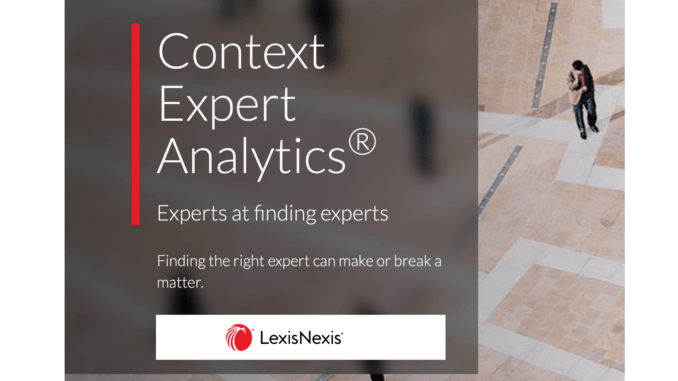
LexisNexis in the UK has launched its first special module for the Context research platform on this side of the Atlantic, with Context Expert Analytics offering NLP-driven insights into expert witnesses.
Context, which has been based on the NLP capabilities gained from the acquisition of legal tech startup RAVEL in 2017, has been focused on the US, but now those capabilities will be available in the UK.
Andy Sparkes, Chief Product Officer for LexisNexis in the UK, explained to Artificial Lawyer that this is just the first of several modules for Context over here. Others may focus on areas such as law firms, clients, and judges – all in relation to litigation research.
The new Context Expert Analytics module covers a broad range of capabilities. Naturally, it helps you find experts that are relevant to your matter – and it does this by analysing LexisNexis’s massive library of past cases. But it does a lot more.
It links that expert you’ve found with any published academic works they may have produced – and this is done via an information sharing alliance with publisher Elsevier, which is owned by the same parent group, RELX.
Other things it can do include:
- Gives information on the experts related to: analytics and statistics on the outcome of cases, information on the hiring party, number of cases per year and total number of cases.
- Presents a clear sentiment analysis for judicial comments – ‘making it simple to rank experts by the expert’s actual impact’.
- And lawyers can instantly delve into the details and read exactly what was said in court and read the relevant parts of the judgment.
Sparkes said: ‘This has taken about a year of work to deliver. We took the underlying tech from the US Context platform and then had to tweak it for the UK. We had to rewrite the algorithms as court cases here are written differently. What you get now with this module is a rounded picture of an expert.’
‘We chose the area of experts after client feedback that this was a considerable pain point for them,’ he added.
He also noted that they will be working on linking this UK set of experts to the US system. The company will also be developing something similar in the Australia/Asia-Pacific region.
As to why they’ve done this, aside from the client pain point, Sparkes explained: ‘This is all about our strategy of applied legal intelligence, with the aim of building actionable insights for our customers.’ – (See April’s AL feature on this strategy.)
One last point that Sparkes mentioned is that Lexis will be updating the UK platform’s capabilities constantly, usually within 24 hours, so that any new cases are reflected in the results. And as mentioned, they have a big library in the shape of the UK’s largest collection of case law – over 600,000 cases, with 16 million author profiles in Elsevier’s abstract and citation database.
All in all this is a significant move for LexisNexis. One of the challenges this site has seen over the years is that great legal research products are developed by a range of companies in the US – which naturally then focus on the US market, which is the largest in the world.
Lexis is now taking the NLP capabilities they have in one market and applying them to another, namely the UK, which is the second largest legal market in the world. And that’s a positive step for lawyers over here.
LexisNexis Director of Solutions, Dani McCormick, added in a statement: ‘Our beta clients love how easily they can find new experts and, in particular, how simple it is to validate their expertise and understand how they performed under pressure in court.’